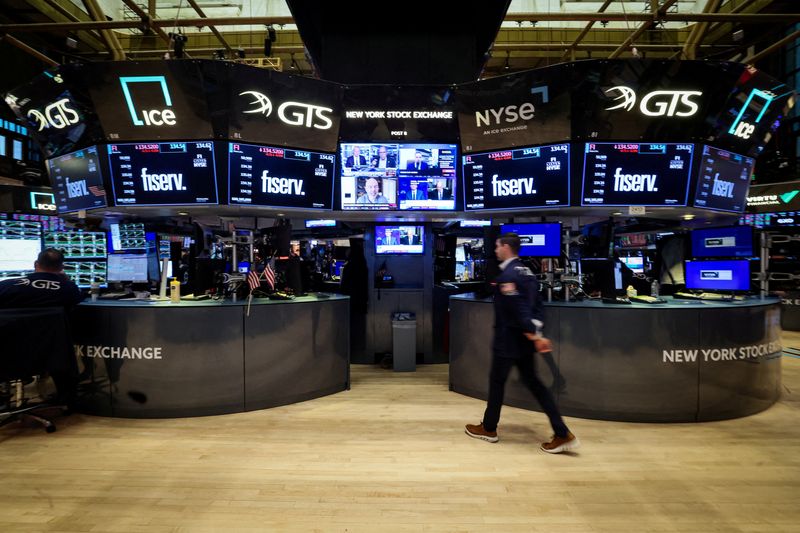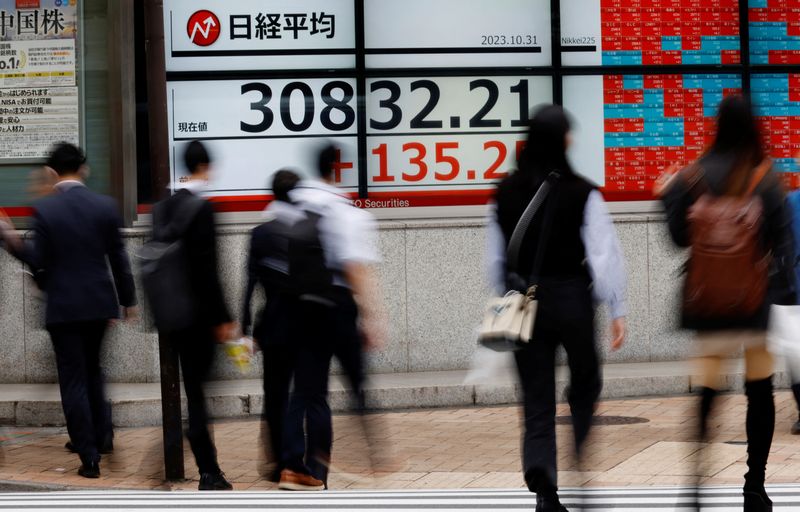By Sinéad Carew
NEW YORK (Reuters) - MSCI's global equities index rose on Monday as Wall Street fed on momentum that took it to a new record high last week, while the U.S. dollar index edged up slightly.
U.S. Treasury yields fell as investors took advantage of a recent decline in bond prices to enter the market ahead of economic indicators due out later this week that may give new information on the direction of interest rates.
The benchmark S&P 500 scaled a fresh record-high after closing at a record on Friday for the first time in two years, confirming it was in a bull market.
"If anything, what we're seeing is a carry-over of the strength from the last couple of trading sessions. That's probably starting to get money in off the sidelines," said Matt Stucky, chief portfolio manager for equities at Northwestern Mutual Wealth Management Company.
"There could just be some fear of missing out driving this, with a lot of liquidity still to enter into equity markets. Narratives tend to follow prices in the mind of retail investors. The S&P 500 at an all-time high gives them another data point to say things are getting better faster than what we were thinking."
The Dow Jones Industrial Average rose 138.01 points, or 0.36%, to 38,001.81, the S&P 500 gained 10.62 points, or 0.22%, to 4,850.43 and the Nasdaq composite gained 49.32 points, or 0.32%, to 15,360.29.
The MSCI world equity index, which tracks shares in 49 nations, gained 0.29%. Europe's STOXX 600 index rose 0.77%.
In Treasuries, the yield on benchmark 10-year Treasury notes rose to 4.1091% compared with its U.S. close of 4.146% on Friday. The two-year yield, which rises with traders' expectations of higher Fed fund rates, touched 4.3932% compared with a U.S. close of 4.408%.
In currencies, the U.S. dollar was little changed to modestly higher against a basket of currencies on Monday ahead of central bank policy decisions in Japan and the euro zone that may determine the currency's direction this year.
"Dollar is in a bit of a holding pattern until central banks kick off tomorrow," said Helen Given, FX trader at Monex USA in Washington.
The dollar index, which tracks the greenback against a basket of currencies of other major trading partners, was up 0.08% at 103.35. The greenback dropped 0.04% against the yen to 148.08. The European single currency was down 0.1% on the day at $1.0882, having lost 1.4% in a month.
The Bank of Japan is expected to keep policy super-easy at a meeting on Tuesday while the European Central Bank (ECB) meets on Thursday and is expected to hold monetary policy steady.
Central banks in Canada and Norway also meet this week and no changes to rates are expected, though Turkey is thought likely to hike again. The U.S. Federal Reserve is scheduled to meet again Jan. 30-31.
Spot gold prices fell 0.44% to $2,020.36 an ounce as investors rolled back expectations of a U.S. interest rate cut at the end of March, with a surge in equity markets further dampening interest in safe-haven bullion.
Oil prices rose as traders saw oil supply tightening due to conflicts in the Middle East and Ukraine, as well as extreme North American cold weather, while the bullish U.S. stock market signalled demand growth ahead.
U.S. crude settled up 2.4% at $75.19 a barrel. Brent crude settled up 1.9% at $80.06 per barrel.
In crypto currencies, Bitcoin earlier fell to a seven-week low and was last down around 4% at $39,936.
Earlier in Beijing, the central bank again skipped a rate cut in its market operations on Monday.

China and Hong Kong shares slumped, as relentless foreign outflows and a surge in short-selling pummelled confidence already hurt by the region's creaking economy.
China's blue-chip CSI300 Index dropped 1.6% to its lowest closing level in nearly five years while in Hong Kong, the benchmark Hang Seng Index tumbled 2.3% to its lowest level in 14 months.
